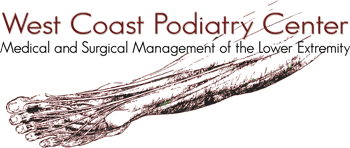Introducing
Wound Care Center of Excellence
at West Coast Podiatry
The premier lower extremity wound center in the region
Effective in-office treatments
Multiple treatment modalities available
Experienced team of wound care specialists
Specialized wound care center for lower extremity wounds with in-office treatments that help chronic wounds heal faster
We care for our patients who are stakeholders in their own healing. It takes highly skilled specialists to help heal your wounds and at West Coast Podiatry Center we also help you with our unique regenerative protocols. Over the last 30 years, our expertise has grown to the point where now we are consulted on the overwhelming majority of all lower extremity wounds at Sarasota Memorial. We are leveraging our experience in the hospital, as well as hospital based wound centers to offer a curated selection of wound protocols and skin substitutes using international research and evidence-based medicine to deliver a process of wound healing that is unmatched in our area.
Benefit to you

Avoid large hospital co-pays while still taking advantage of West Coast Podiatry Center’s referral network of wound experts in vascular surgery and infectious disease. Access to more skin substitutes and treatment options than are available in hospital based wound centers.
Comprehensive Wound Therapy Treatments
We have unparalleled experience and procedures to help patients dealing with chronic wounds. Our team, combined with being a leader in offering advanced treatment modalities enables our patients to have improved outcomes and accelerated healing.
Multiple Treatment Therapies
Wound debridement
Compression therapy
Off-loading
In-office skin substitutes and grafting
Advanced Treatment Therapies
Laser therapy
Shockwave
We treat lower extremity wounds related to the following conditions
Complications of diabetes
Complications of diabetes can have a profound impact on the lower legs and feet, particularly when it comes to wound healing. Diabetes can cause damage to blood vessels and nerves, leading to poor circulation and decreased sensation in the extremities. This combination of reduced blood flow and diminished ability to perceive pain can create a significant risk for the development of foot ulcers. These ulcers may occur due to minor injuries or pressure points that go unnoticed and untreated. Furthermore, diabetes can impair the body’s immune response, making it harder for wounds to heal properly. High blood sugar levels also promote the growth of bacteria and increase the risk of infection in open wounds. Without timely and appropriate care, diabetic foot ulcers can become chronic, leading to tissue damage, deep infections, and even the need for amputation.
Complications of vascular disease
Complications of vascular disease can significantly impact the lower legs and feet, particularly in relation to wounds and ulcers. Vascular disease, such as peripheral artery disease (PAD), involves the narrowing or blockage of blood vessels, leading to reduced blood flow to the extremities. This impaired circulation can result in tissue damage and delayed wound healing. The lack of adequate oxygen and nutrients reaching the affected areas can make the skin more vulnerable to injuries and slower to repair. Additionally, vascular disease can contribute to the development of venous insufficiency, a condition characterized by damaged or weakened leg veins that impede blood flow back to the heart. Venous insufficiency can lead to venous leg ulcers, which are chronic wounds commonly found in the lower legs. The combination of compromised blood flow, reduced oxygen supply, and impaired healing processes makes individuals with vascular disease more susceptible to the formation of wounds and ulcers.
Complications of neuropathy
Neuropathy refers to nerve damage, often associated with conditions like diabetes, that can lead to loss of sensation and impaired nerve function. When neuropathy affects the lower extremities, it can result in a decreased ability to feel pain, pressure, or temperature changes. As a result, individuals with neuropathy may be unaware of injuries or wounds on their feet and legs. Minor cuts, blisters, or abrasions can go unnoticed and untreated, leading to infection and ulceration. Furthermore, neuropathy can also affect the function of sweat glands, leading to dry and cracked skin, further increasing the risk of developing wounds. The combination of reduced sensation and compromised skin integrity makes individuals with neuropathy more susceptible to foot and leg ulcers, which can be challenging to heal due to the underlying nerve damage and impaired blood flow.
Prolonged wearing of ill-fitting shoes
Prolonged wearing of ill-fitting shoes can contribute to the development of lower extremity wounds. When shoes do not fit properly, they can create excessive pressure and friction on certain areas of the feet and legs. This can result in the formation of blisters, corns, calluses, and other types of skin damage. Over time, if the pressure and friction persist, these superficial injuries can progress into open wounds, particularly if the skin is already compromised due to factors like dryness or poor circulation. Additionally, ill-fitting shoes can also cause structural problems, such as bunions or hammertoes, which further increase the risk of developing wounds. The continuous rubbing and pressure from tight or poorly designed shoes can disrupt the natural alignment of the foot, leading to abnormal pressure points and areas of vulnerability
Long periods of bedrest of immobility
Long periods of bedrest can contribute to the formation of foot or lower leg wounds and ulcers through a process called pressure ulcers or bedsores. When an individual remains in a static position for an extended period, the continuous pressure on specific areas of the body, particularly bony prominences, can impede blood flow to the tissues. Reduced blood supply deprives the skin and underlying tissues of oxygen and essential nutrients, making them more susceptible to damage. Additionally, the friction and shear forces that occur during movements or when sliding against bedding can further exacerbate the risk of skin breakdown. The heels, ankles, and other bony areas of the foot and lower leg are particularly vulnerable due to their proximity to the surface and lack of protective padding. Over time, the sustained pressure, combined with limited mobility and impaired circulation, can lead to tissue damage, skin breakdown, and the formation of painful and difficult-to-heal wounds or ulcers.
Injuries that break the skin
Skin infections
Contact us today to schedule your wound care consultation
941-366-2627

